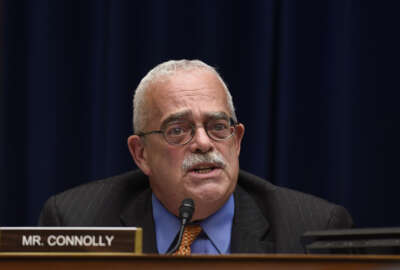
OPM is urging agencies to to consider telework and flexibilities during this week’s heat wave
In today's Federal Newscast, the Office of Personnel Management is urging agencies to consider telework and workplace flexibilities during this week's heat wave.
July 18, 2019 1:24 pm
5 min read
To listen to the Federal Newscast on your phone or mobile device, subscribe on PodcastOne or Apple Podcasts. The best listening experience on desktop can be found using Chrome, Firefox or Safari.
- The Office of Personnel Management is urging agencies to consider telework and workplace flexibilities during this week’s heat wave. Telework-ready employees with permission from their supervisors can work from home on days when the air quality is bad. Employees can also consider adjusting their hours to avoid commuting during the hottest periods of the day. OPM said agencies should do everything they can to keep federal employees healthy and safe during severe heat and humidity. (Chief Human Capital Officers Council)
- More than half of Economic Research Service employees and two thirds of National Institute of Food and Agriculture employees selected by the Agriculture Department to move to Kansas City say they’ll reject the relocation. Employees were supposed to inform the department of their relocation decisions by July 15. USDA said the numbers may change, and that employees have until Sept. 30 to make a final decision. (Federal News Network)
- The Army said its Futures Command will be fully operational at the end of July. It set up Futures Command at the beginning of 2018 to streamline acquisition and keep acquisition and research teams under one organizational roof. Futures Command is focusing on areas like long range precision fires and soldier lethality.
- Agencies have new guidance on how they can best evaluate whether their telework programs are effective. The Office of Personnel Management said agencies should use employee engagement and other data to determine whether their work-life programs are meeting organizational priorities. OPM said it developed new guidance based on a recommendation from the Government Accountability Office. Agencies often have anecdotal evidence of telework’s success, but OPM said agencies should use evidence-based strategies to show how well the programs are working. (Federal News Network)
- The Department of Homeland Security released its plan for its next generational IT products and services contract. DHS decided to move to version three of the First Source IT products and services contract. The agency’s Chief Procurement Officer Soraya Correa announced on FedBizOpps that First Source III will have set-aside tracks across each of the five socio-economic categories. It also will include specific ordering flexibilities for DHS. Correa said her office is working with the Office of the Chief Information Officer and across the components to iron out the scope of First Source III and establish an estimated timeline. DHS has obligated more than $2.8 billion on First Source contracts since 2013. (FedBizzOpps)
- Agencies paid out more than $150 billion in improper payments last year, but a bill to curb those costs is one step closer to becoming law. The Senate passed the Payment Integrity Information Act, which would require agencies to identify their programs with the highest rate of improper payments. The bill would also require the Office of Management and Budget and the Council of the Inspectors General on Integrity and Efficiency to issue guidance to agencies on best practices to curb improper payments. (Tom Carper)
- There’s renewed optimism on Capitol Hill about a two-year budget deal that would avoid another round of automatic spending cuts. House Speaker Nancy Pelosi (D-Calif.) said a spending deal is needed this week to make sure Congress can pass it before the August recess. But Congressional officials say negotiations between Pelosi, Senate Majority Leader Mitch McConnell (R-Ky.) and the Trump Administration are close to the finish line. An agreement is needed by the end of this fiscal year to end the threat of another government shutdown. It’s also a prerequisite for Congress to start passing appropriations bills for 2020. (Federal News Network)
- The Professional Aviation Safety Specialists is ringing the alarm bells over a looming potential government shutdown. PASS, which represents 11,000 Federal Aviation Administration employees, told the House Transportation Subcommittee on Aviation yesterday that another government shutdown in October would be of greater impact than the 35-day shutdown that happened earlier this year. Michael Perrone, the president of PASS, said the FAA is still recovering from the January shutdown, which caused backlogs in safety inspections and the processing of airline requests. (Professional Aviation Safety Specialists)
- The president’s nominee to be the Federal Labor Relations Authority’s general counsel is expected to easily clear Senate confirmation. Catherine Bird faced the Senate Homeland Security and Governmental Affairs Committee for her nomination hearing. Two federal employee unions had expressed their concerns with Bird’s nomination to the committee. Bird said she was obligated to represent management’s interests during past stints as a negotiator or consultant for the Departments of Health and Human Services and Veterans Affairs. She said she’ll use existing federal statute to objectively review unions’ unfair labor practice complaints as the FLRA general counsel.
- Cloud service providers looking to do business with the Defense Department won’t have to go through a separate approval process once they’ve met FedRAMP’s baseline standards. Jack Wilmer, DoD’s chief information security officer, said DoD will issue general provisional authorizations to vendors that have a provisional authority to Operate at the FedRAMP moderate impact level. Prior to this change, vendors had to meet 38 additional cybersecurity controls beyond FedRAMP’s moderate’s baseline of 325 controls. (Federal News Network)
- Companies spend millions and wait years to get FedRAMP-certified, even if they’ve already gotten the go-ahead from other agencies. Reps. Gerry Connolly (D-Va.) and Mark Meadows (R-N.C.) plan to introduce a bill that would codify the FedRAMP process into law. The bill also would require agencies to presume that once a vendor has met the FedRAMP security criteria at one agency, they won’t have to go through the entire process all over again at another agency. (Federal News Network)
Copyright © 2025 Federal News Network. All rights reserved. This website is not intended for users located within the European Economic Area.
Related Stories
Rep. Gerry Connolly (D-Va.)/AP/Susan Walsh

Connolly, Meadows to introduce bill to serve as ‘statutory anchor’ for FedRAMP
Related Topics
Agriculture Department
All News
Army
Catherine Bird
Defense
Defense News
Department of Homeland Security
Economic Research Service
Federal Aviation Administration
Federal Drive
Federal Labor Relations Authority
Federal Newscast
FedRAMP
Gerry Connolly
Government Accountability Office
Government Shutdown
Management
Mark Meadows
National Institute of Food and Agriculture
Office of Management and Budget
Office of Personnel Management
Payment Integrity Information Act
Professional Aviation Safety Specialists
Soraya Correa
telework
Workforce



